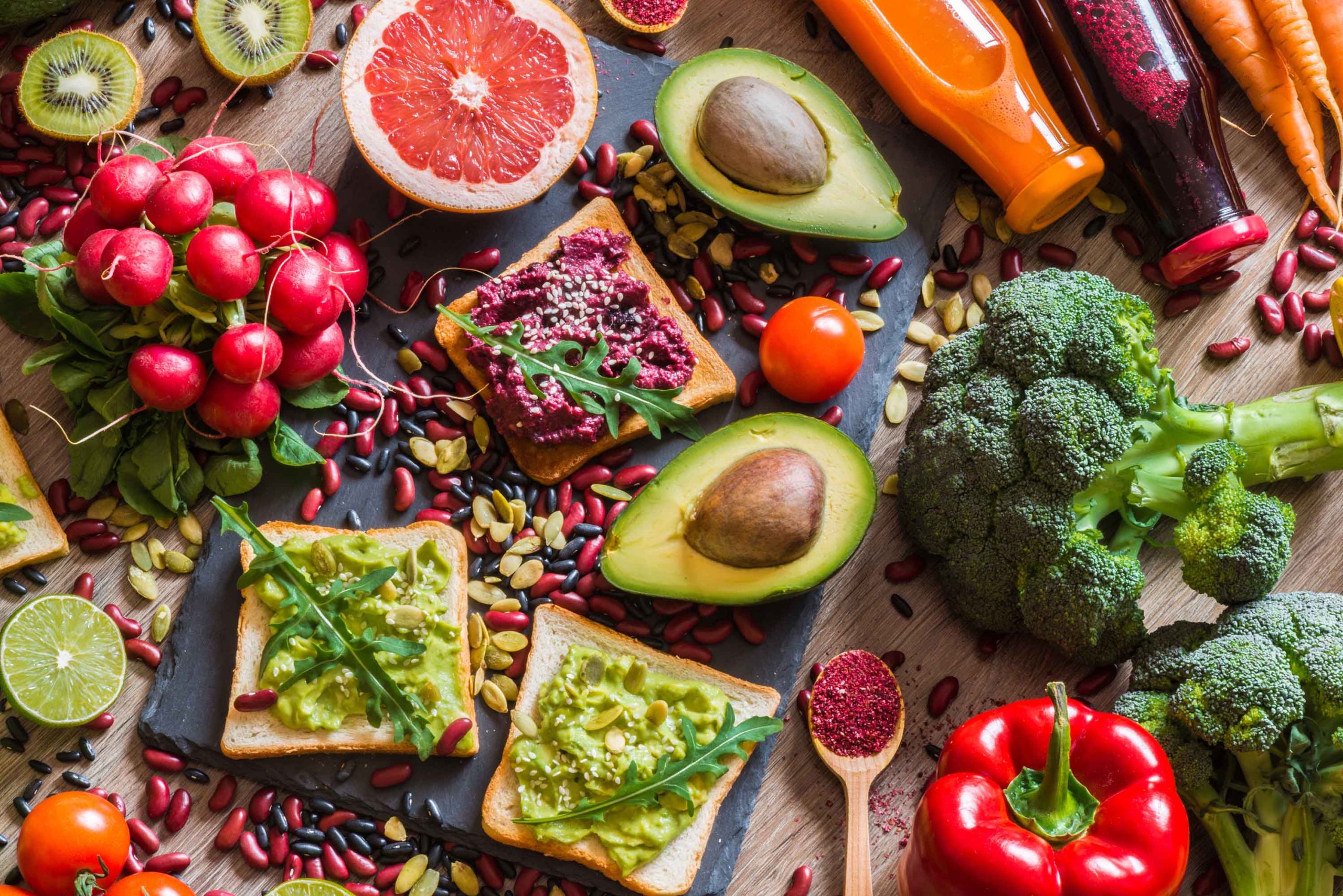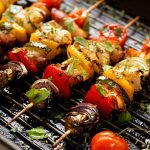
What are vegetarian and vegan diets?
Vegetarian and vegan diets help reduce your risk of disease. They can also provide you with all the protein, minerals and most vitamins your body needs.
Vegetarians don’t eat meat, poultry or seafood. However, there are different types of vegetarian diet:
- Lacto-ovo vegetarians eat eggs and dairy products.
- Vegans don’t eat any animal products, including honey and gelatine.
Pescatarians are not strictly vegetarian as they eat seafood, but still focus on a diet high in plants.
People may follow a vegetarian or vegan diet for religious reasons, or as a sustainable, ethical choice.
What are the health benefits of a vegetarian diet?
Vegetarian diets can also be good for your health when well planned. A vegetarian diet based on vegetables, legumes, beans, wholegrains, fruits, nuts and seeds can help reduce the risk of:
- heart disease
- high blood pressure
- type 2 diabetes
- obesity
- some types of cancer
- gallstones
- gout
- kidney disease
- diverticular disease
Dietary fibre in a plant-based diet increases the ‘good’ bacteria in your bowel. This can:
- improve gut health
- reduce inflammation
How can I meet my nutritional needs with a vegetarian diet?
A well-planned vegetarian diet that includes a variety of plant-based foods can meet your nutritional needs. This includes foods from the 5 food groups. However, some nutrients may need special attention.
A vegan diet requires extra care to ensure your body gets adequate nutrients — particularly in the case of children’s diets.
Here’s how you can get enough protein, calcium, iron and other nutrients on a vegetarian or vegan diet.
Protein
Protein is made up of amino acids. Essential amino acids can’t be made in the body. They are typically found in meat, poultry, fish, eggs, milk, cheese and yoghurt.
Not all plants have all the essential amino acids. However, you can get all the amino acids you need by eating a variety of plant sources of protein each day.
Good sources of protein include:
- legumes such as chickpeas, lentils and beans
- tofu
- nuts, except coconut
- seeds such as sunflower, pumpkin, chia and sesame
- grains such as wheat, oats, barley, quinoa and buckwheat
Calcium
Lacto-vegetarians get calcium from milk, cheese and yoghurt.
Good sources of calcium for vegans include:
- tofu processed with calcium salt (check the label)
- soy or alternative milk drinks with added calcium (look for 120 mg calcium per 100 mL)
- almonds
- tahini
- Asian greens, such as bok choy
Iron
There are 2 types of iron in food: haem and non-haem. Haem iron is absorbed better than non-haem iron. Meat, poultry and seafood are sources of haem iron. Eggs and plant foods have only non-haem iron.
Plant foods can still provide an adequate amount of iron for the body but should be eaten with a food high in vitamin C to maximise absorption. Good sources of iron include:
- legumes such as lentils, beans and chickpeas
- firm tofu
- tempeh
- pumpkin seeds (also called pepitas) and sunflower seeds
- nuts, especially cashews and almonds
- wholegrain cereals such as oats or muesli, wholemeal bread, brown rice, amaranth and quinoa
- dried apricots
- vegetables such as kale, broccoli, spinach and green peas
Including fruits or vegetables which are all high in vitamin C at each meal helps you absorb non-haem iron. Try eating:
- berries kiwifruit, melon or drinking an occasional, small glass of orange juice at breakfast
- salad, home-made vegetable soup or fresh fruit for lunch
- vegetables such as broccoli, capsicum, cabbage, cauliflower, snow peas, kale, pumpkin, spinach or tomatoes at dinner
People who menstruate (also known as your period) need about twice as much iron than people who don’t menstruate, to replace the amount lost in blood until menopause, when menstruation stops.
Pregnant people need even more iron, although they’re better at absorbing non-haem iron. If you’re concerned about your iron levels, see your doctor about getting a blood test.
Vitamin B12
Vitamin B12 helps blood form and allows the nervous system to function properly. This vitamin is found in animal foods including milk, cheese, yoghurt and eggs. It is also added to some soy or alternative milk drinks and breakfast cereals. Vegetarians should make sure these foods are part of their diet.
Vegans are not able to get enough Vitamin B12 from their diet and will need to supplement their diet with food sources of vitamin B12 or injections. An option is to eat foods fortified with B12, such as some breakfast cereals and some soy or alternative milk drinks. Check the label to make sure they are supplemented with vitamin B12.
Spirulina, unfortified nutritional yeast, comfrey, tempeh and mushrooms are not sources of vitamin B12.
Omega 3 Fats
Omega 3 is important for your general health and helps to protect you against disease.
Our bodies make only a very small amount of long-chain omega-3 fats, so it’s essential to get them from your diet.
Long chain omega 3 fats are found in fish, seafood and seaweed. Flax, chia and hemp seeds and oils also provide short-chain omega-3 fats.
Vegans can take an algal-based omega-3 supplement to be sure to get enough long-chain omega-3 fats.
Pregnant women and young children who are vegetarians should also take an omega-3 supplement.
Vitamin D
You need vitamin D for bone health and your immune system.
You can most easily get vitamin D from exposing your skin to the sun for 15 minutes each day.
Eggs are a source of vitamin D. Vitamin D is also found in some fortified plant-based dairy products (milk and margarine).
Is a vegetarian diet safe for my child?
A lacto-ovo vegetarian diet is fine for children as long as they eat a variety of plant foods.
It’s a good idea to seek the advice of a doctor or dietitian before putting children, especially babies and toddlers, on a vegan diet to ensure they get all the nutrients they need.
If not planned correctly, inadequate nutrition due to a restricted diet can be a cause of poor growth and vitamin deficiency in children.
- Breast milk is best for infants and toddlers for the first 2 years. If young children are started on a vegetarian or vegan diet, then seek professional advice to make sure they get enough nutrition.
Should I see a dietitian?
It’s best to consult with a dietitian if you want to start a vegetarian or vegan diet. You should visit a dietitian if:
- You intend to start a vegan diet
- You intend a child or toddler to follow a vegetarian or vegan diet
- You have a history of iron deficiency
- You are pregnant, breastfeeding or planning a pregnancy
Tips for vegetarians and vegans
- eat 2 pieces of fruit and 5 handfuls of vegetables every day
- eat a variety of plant foods including wholegrain breads and cereals, legumes, nuts, seeds and beans
- make sure your milk substitutes are calcium enriched
- get your iron levels checked
- if you are following a vegan diet, also include a vitamin B12 supplement

